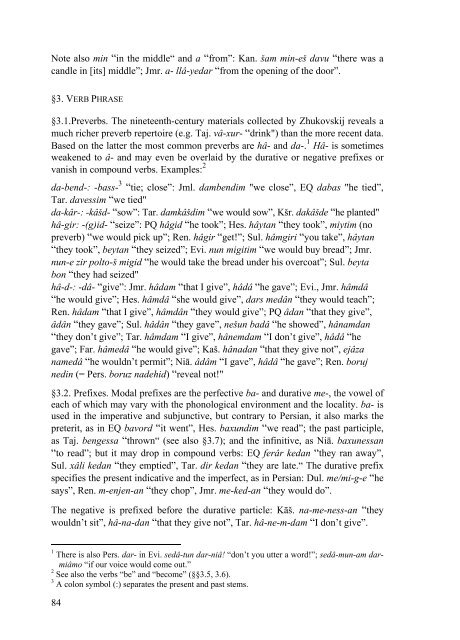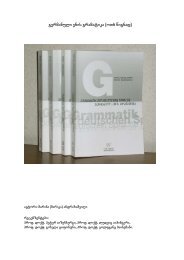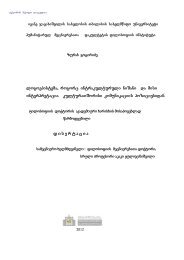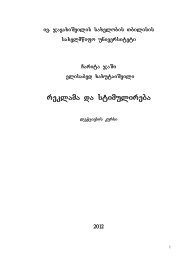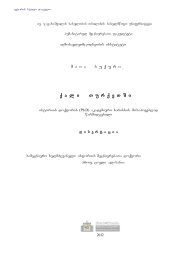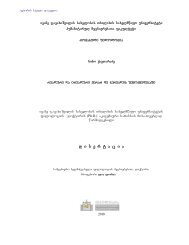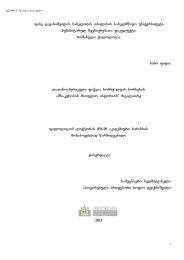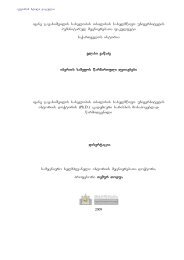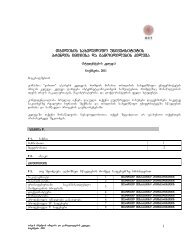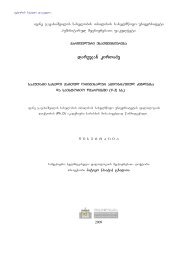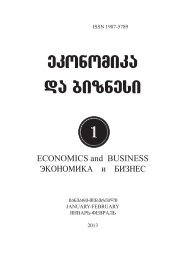issues of linguistics - Tbilisi State University
issues of linguistics - Tbilisi State University
issues of linguistics - Tbilisi State University
You also want an ePaper? Increase the reach of your titles
YUMPU automatically turns print PDFs into web optimized ePapers that Google loves.
Note also min “in the middle“ and a “from”: Kan. šam min-eš davu “there was a<br />
candle in [its] middle”; Jmr. a- llâ-yedar “from the opening <strong>of</strong> the door”.<br />
§3. VERB PHRASE<br />
§3.1.Preverbs. The nineteenth-century materials collected by Zhukovskij reveals a<br />
much richer preverb repertoire (e.g. Taj. vâ-xur- “drink") than the more recent data.<br />
Based on the latter the most common preverbs are hâ- and da-. 1 Hâ- is sometimes<br />
weakened to â- and may even be overlaid by the durative or negative prefixes or<br />
vanish in compound verbs. Examples: 2<br />
da-bend-: -bass- 3 “tie; close”: Jml. dambendim "we close”, EQ dabas "he tied”,<br />
Tar. davessim “we tied"<br />
da-kâr-: -kâšd- “sow”: Tar. damkâšdim “we would sow”, Kšr. dakâšde “he planted"<br />
hâ-gir: -(g)id- “seize”: PQ hâgid “he took”; Hes. hâytan “they took”, miytim (no<br />
preverb) “we would pick up”; Ren. hâgir “get!”; Sul. hâmgiri “you take”, hâytan<br />
“they took”, beytan “they seized”; Evi. nun migitim “we would buy bread”; Jmr.<br />
nun-e zir polto-š migid “he would take the bread under his overcoat”; Sul. beyta<br />
bon “they had seized"<br />
hâ-d-: -dâ- “give”: Jmr. hâdam “that I give”, hâdâ “he gave”; Evi., Jmr. hâmdâ<br />
“he would give”; Hes. hâmdâ “she would give”, dars medân “they would teach”;<br />
Ren. hâdam “that I give”, hâmdân “they would give”; PQ âdan “that they give”,<br />
âdân “they gave”; Sul. hâdân “they gave”, nešun badâ “he showed”, hânamdan<br />
“they don’t give”; Tar. hâmdam “I give”, hânemdam “I don’t give”, hâdâ “he<br />
gave”; Far. hâmedâ “he would give”; Kaš. hânadan “that they give not”, ejâza<br />
namedâ “he wouldn’t permit”; Niā. âdâm “I gave”, hâdâ “he gave”; Ren. boruj<br />
nedin (= Pers. boruz nadehid) “reveal not!"<br />
§3.2. Prefixes. Modal prefixes are the perfective ba- and durative me-, the vowel <strong>of</strong><br />
each <strong>of</strong> which may vary with the phonological environment and the locality. ba- is<br />
used in the imperative and subjunctive, but contrary to Persian, it also marks the<br />
preterit, as in EQ bavord “it went”, Hes. baxundim “we read”; the past participle,<br />
as Taj. bengessa “thrown“ (see also §3.7); and the infinitive, as Niā. baxunessan<br />
“to read”; but it may drop in compound verbs: EQ ferâr kedan “they ran away”,<br />
Sul. xâli kedan “they emptied”, Tar. dir kedan “they are late.“ The durative prefix<br />
specifies the present indicative and the imperfect, as in Persian: Dul. me/mi-g-e “he<br />
says”, Ren. m-enjen-an “they chop”, Jmr. me-ked-an “they would do”.<br />
The negative is prefixed before the durative particle: Kāš. na-me-ness-an “they<br />
wouldn’t sit”, hâ-na-dan “that they give not”, Tar. hâ-ne-m-dam “I don’t give”.<br />
1<br />
There is also Pers. dar- in Evi. sedâ-tun dar-niâ! “don’t you utter a word!”; sedâ-mun-am darmiâmo<br />
“if our voice would come out.”<br />
2<br />
See also the verbs “be” and “become” (§§3.5, 3.6).<br />
3<br />
A colon symbol (:) separates the present and past stems.<br />
84


